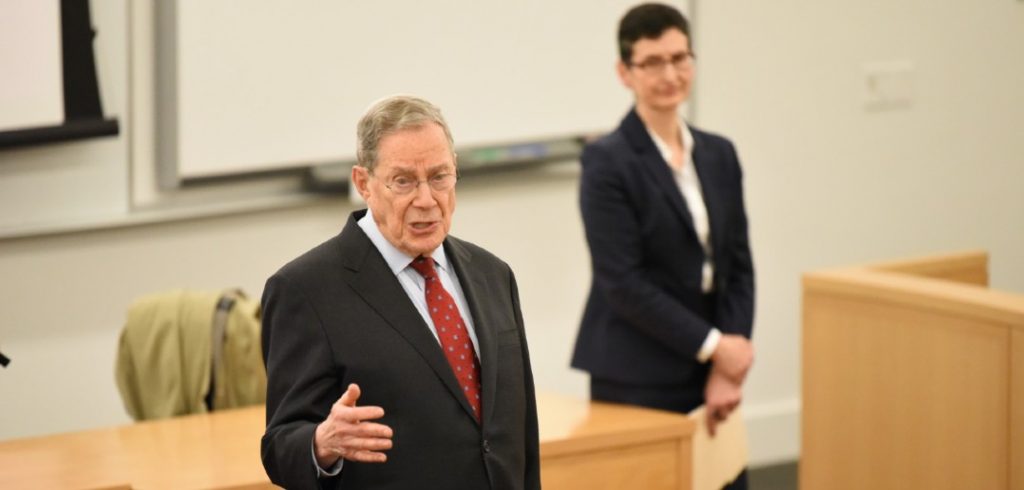Professor Peter B. Edelman, Carmack Waterhouse Professor of Law and Public Policy and faculty director of the Center of Poverty and Inequality at Georgetown University Law Center, visited Fordham Law on Feb. 27 to discuss the criminalization of poverty in the United States. The event was part of the Feerick Center for Social Justice Luncheon Speaker Series.
In his introduction of Edelman, Dean Matthew Diller, who has a deep interest in issues of social justice and poverty law, said Edelman was one of his heroes when he transitioned from poverty law practice to teaching law more than 25 years ago. “You were a model for me of how one can—through work in the academy, work with law students, and work through teaching—continue to focus on issues of poverty and on the way which law in our legal system has disadvantaged marginalized individuals and communities,” said Diller of Edelman “That has been your mission throughout your career … one that you carried through as a model of what a law professor can do and what a law professor can be.”
Edelman was a legislative assistant to Senator Robert F. Kennedy and the issues director for Senator Edward Kennedy’s 1980 presidential campaign. He said he first became drawn to poverty- and race-related work following Robert Kennedy’s death in 1968. “It wasn’t a plan. It was more like a feeling,” Edelman told the packed room, filled with law students, alumni, and faculty. “Nothing means as much to me as my teaching, guiding young people who are public interest lawyers and ones who want to pursue justice by reducing poverty across the country.”
Edelman later served as law clerk to Judge Henry J. Friendly on the U.S. Court of Appeals for the Second Circuit and to Supreme Court Justice Arthur J. Goldberg. In the executive branch, Edelman was counselor to the Department of Health and Human Services Secretary Donna Shalala and the assistant secretary for planning and evaluation during the Clinton administration—a post he resigned in protest of the Welfare Reform Act and Temporary Assistance for Needy Families program, which dismantled cash income assistance to families.

In his remarks at Fordham Law, Edelman argued that three intertwined crises impact young people of color across the country—the criminalization of poverty, lack of lawyers, and the connection between racism and poverty. Additionally, he said there is a “national epidemic” of fees and fines, driver’s license suspensions, and money bail abuse. “Two out of three current or former inmates owe unpaid fines and fees, including charges for room and board [in jail], and it adds up to 10 million people owing $50 billion. It’s a government-operated loan shark system,” he said.
According to Edelman, 700,000 people are in jail everyday—including 450,000 who are not guilty, but are jailed for not posting bail. He explained that fines imposed for minor misdemeanors mount when individuals are unable to pay due to lack of funds and accessibility. One example Edelman cited was the arrest of Adel Edwards, who was fined $1,028 five years ago ($500 for burning leaves in his yard without a permit, $528 for probation “supervision” costs). When Edwards—who is intellectually disabled and whose income consisted of food stamps—was placed on probation for a year and sent to jail for being unable to pay his $250 bail, Sarah Geraghty of the Southern Center for Human Rights represented him. “If Geraghty had not found him, we would not know about him and he would be one of the thousands without a lawyer who would still be stuck,” Edelman said. “Lawyers are crucial.”
Edelman noted that while lawyers, legislators, and journalists have made progress fighting against these issues, much more can be done. He argued, for example, that more pro bono work is needed and that improved public policies should be implemented.
“We now have 18 million people in this country who have income below the poverty line. In 40 years, that’s doubled. The number of families with children getting cash income assistance went from 68 percent to 23 percent,” Edelman added, citing 2016 statistics. “The worst thing is we don’t talk about it as a country … when we talk about wealthy people at the top, we need to pay more attention to those at the bottom.”

